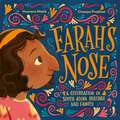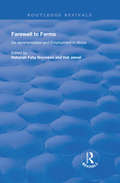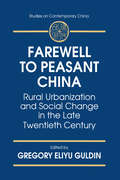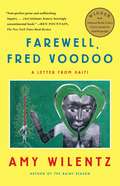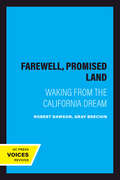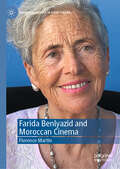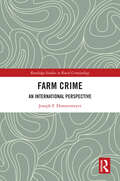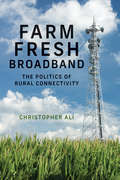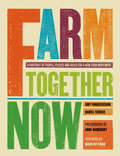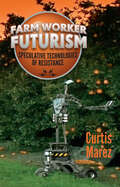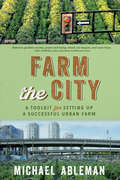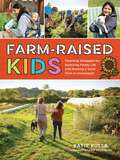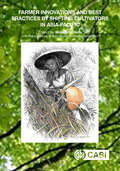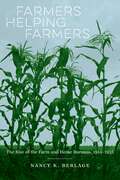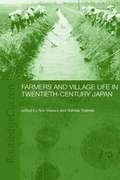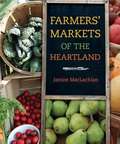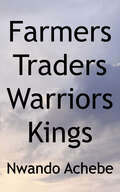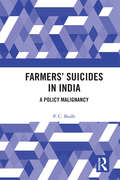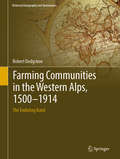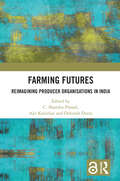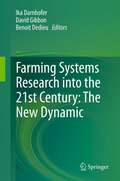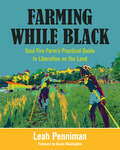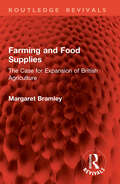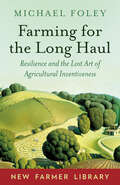- Table View
- List View
Farah's Nose: A celebration of South Asian heritage and family
by Humera MalikFarah hates her "strong" nose, despite Dadi Ama telling her that it should make her proud. "How can I be proud of my nose?", Farah wondered.When Farah visits a South Asian heritage photography exhibition at her local museum, she is surrounded by pictures of determined, proud women with the same nose. As she reads about the immigrant women who bravely moved to new lands, learned new languages and shared their culture, Farah is finally able to see past her nose, to the trailblazers, mothers, leaders and friends it represents.Featuring historical facts throughout the story, this beautifully illustrated story introduces all children to South Asian heritage and history.
Farewell to Farms: De-Agrarianisation and Employment in Africa (Routledge Revivals)
by Deborah Fahy Bryceson Vali JamalFirst published in 1997, this volume asks whether Africa’s future is necessarily rooted in peasant agriculture. The title of this book, Farewell to Farms, is deliberately intended to challenge the widely held view that Africa is the world’s reserve for peasant farming. African rural populations are themselves moving away from a reliance on agriculture. ‘De-agrarianisation’ takes the form of urban migration as well as the expansion of non-agricultural activities in rural areas providing new income sources, occupations and social identities for rural dwellers. Using recent continent-wide case study evidence, the authors assess the impact of de-agrarianisation on household welfare, business performance and national development. Their findings, which reveal new economic trajectories and social patterns emerging from a period of accelerated change, call into question assumptions about Africa’s future place in the world division of labour.
Farewell to Peasant China: Rural Urbanization and Social Change in the Late Twentieth Century (Studies On Contemporary China)
by Gregory Eliyu GuldinChinese urbanization, including the daily life, migration strategies, and life choices of villagers and townspeople, is the focus of this study by Chinese and North American scholars. The study looks at the urbanization process and the vitality of post-reform Chinese society.
Farewell, Fred Voodoo
by Amy WilentzThe Rainy Season, Amy Wilentz's award-winning 1989 portrait of Haiti after the fall of Jean-Claude Duvalier, was praised in the New York Times Book Review as "a remarkable account of a journalist's transformation by her subject." In her relationship with the country since then, Wilentz has witnessed more than one magical transformation. Now, with Farewell, Fred Voodoo, she gives us a vivid portrayal of the extraordinary people living in this stark place. Wilentz traces the country's history from its slave plantations through its turbulent revolutionary history, its kick-up-the-dirt guerrilla movements, its totalitarian dynasty that ruled for decades, and its long and always troubled relationship with the United States. Yet through a history of hardship shines Haiti's creative culture--its African traditions, its French inheritance, and its uncanny resilience, a strength that is often confused with resignation. Haiti emerged from the dust of the 2010 earthquake like a powerful spirit, and this stunning book describes the country's day-to-day struggle and its relationship to outsiders who come to help out. There are human-rights reporters gone awry, movie stars turned aid workers, priests and musicians running for president, doctors turned diplomats. A former U.S. president works as a house builder and voodoo priests try to control elections. A foreign correspondent on a simple story becomes, over time and in the pages of this book, a lover of Haiti, pursuing the essence of this beautiful and confounding land into its darkest and brightest corners. Farewell, Fred Voodoo is a spiritual journey into the heart of the human soul, and Haiti has found in Amy Wilentz an author of astonishing wit, sympathy, and eloquence.
Farewell, Promised Land: Waking from the California Dream
by Robert Dawson Gray BrechinThis title is part of UC Press's Voices Revived program, which commemorates University of California Press’s mission to seek out and cultivate the brightest minds and give them voice, reach, and impact. Drawing on a backlist dating to 1893, Voices Revived makes high-quality, peer-reviewed scholarship accessible once again using print-on-demand technology. This title was originally published in 1999.This title is part of UC Press's Voices Revived program, which commemorates University of California Press’s mission to seek out and cultivate the brightest minds and give them voice, reach, and impact. Drawing on a backlist dating to 1893, Voices Revived</DIV
Farida Benlyazid and Moroccan Cinema (Palgrave Studies in Arab Cinema)
by Florence MartinThis book project unfolds and analyzes the work of Moroccan director, producer, and scriptwriter Farida Benlyazid, whose career extends from the beginning of cinema in independent Morocco to the present. This study of her work and career provides a unique perspective on an under-represented cinema, the gender politics of cinema in Morocco, and the contribution of Arab women directors to global cinema and to a gendered understanding of Muslim ethics and aesthetics in film. A pioneer in Moroccan cinema, Farida Benlyazid has been successful at negotiating the sometimes abrupt turns of Morocco’s rocky 20th century history: from Morocco under French occupation to the advent of Moroccan independence in 1956; the end of the international status of Tangier, her native city, in 1959; the “years of lead” under the reign of Hassan II; and finally Mohamed VI’s current reign since 1999. As a result, she has a long view of Morocco’s politics of self-representation as well as of the representation of Moroccan women on screen
Farm Crime: An International Perspective (Routledge Studies in Rural Criminology)
by Joseph F. DonnermeyerA little known and under-appreciated area in criminology is knowledge about the extent, pattern, and costs of crime committed against agriculture. Farm Crime: An International Perspective is the first book to summarize the existing literature from across the globe about agricultural victimization. It demonstrates the vulnerability of farms and farm families to both property and violent crime and how it threatens their livelihood and lifestyles.Written by a pioneer of rural criminology, this book provides both a descriptive synthesis of agricultural victimization and a discussion of various criminological theories applied to its study. Despite the great diversity of farms in different regions of the world and the significant differences between the kinds of crime committed against farms from continent to continent, Farm Crime summarizes common areas of vulnerability. It provides a significant agenda for the future study of agricultural victimization, both in terms of its importance to issues of food security and the safety of farm families around the world.This book is essential reading for green criminologists, rural criminologists, mainstream criminologists, and sociologists alike. It will also be of interest to researchers and policymakers focused on issues of rural development, agricultural policy, and food security.
Farm Fresh Broadband: The Politics of Rural Connectivity (Information Policy)
by Christopher AliAn analysis of the failure of U.S. broadband policy to solve the rural–urban digital divide, with a proposal for a new national rural broadband plan.As much of daily life migrates online, broadband—high-speed internet connectivity—has become a necessity. The widespread lack of broadband in rural America has created a stark urban–rural digital divide. In Farm Fresh Broadband, Christopher Ali analyzes the promise and the failure of national rural broadband policy in the United States and proposes a new national broadband plan. He examines how broadband policies are enacted and implemented, explores business models for broadband providers, surveys the technologies of rural broadband, and offers case studies of broadband use in the rural Midwest. Ali argues that rural broadband policy is both broken and incomplete: broken because it lacks coordinated federal leadership and incomplete because it fails to recognize the important roles of communities, cooperatives, and local providers in broadband access. For example, existing policies favor large telecommunication companies, crowding out smaller, nimbler providers. Lack of competition drives prices up—rural broadband can cost 37 percent more than urban broadband. The federal government subsidizes rural broadband by approximately $6 billion. Where does the money go? Ali proposes democratizing policy architecture for rural broadband, modeling it after the wiring of rural America for electricity and telephony. Subsidies should be equalized, not just going to big companies. The result would be a multistakeholder system, guided by thoughtful public policy and funded by public and private support.
Farm Labor Struggles in Zimbabwe: The Ground of Politics
by Blair RutherfordIn the early twentieth century, white-owned farms in Zimbabwe were subject to large-scale occupations by black urban dwellers in an increasingly violent struggle between national electoral politics, land reform, and contestations over democracy. Were the black occupiers being freed from racist bondage as cheap laborers by the state-supported massive land redistribution, or were they victims of state violence who had been denied access to their homes, social services, and jobs? Blair Rutherford examines the unequal social and power relations shaping the lives, livelihoods, and struggles of some of the farm workers during this momentous period in Zimbabwean history. His analysis is anchored in the time he spent on a horticultural farm just east of Harare, the capital of Zimbabwe, that was embroiled in the tumult of political violence associated with jambanja, the democratization movement. Rutherford complicates this analysis by showing that there was far more in play than political oppression by a corrupt and authoritarian regime and a movement to rectify racial and colonial land imbalances, as dominant narratives would have it. Instead, he reveals, farm worker livelihoods, access to land, gendered violence, and conflicting promises of rights and sovereignty played a more important role in the political economy of citizenship and labor than had been imagined.
Farm Together Now
by Amy Franseschini Daniel TuckeyThe story of the sustainable farming movement, with numerous photos: “Inspirational, informational . . . a glimpse of what the future of food may well look like.” —TreehuggerWith interest in home gardening at an all-time high and concerns about food production and safety making headlines, Farm Together Now explores the current state of grassroots farming in the United States. Part oral history and part treatise on food politics, this fascinating project is an introduction to the many individuals who are producing sustainable food, challenging public policy, and developing community organizing efforts. With hundreds of photographs and a foreword from New York Times columnist Mark Bittman, Farm Together Now will educate, inspire, and cultivate a new wave of modern agrarians.
Farm Worker Futurism: Speculative Technologies of Resistance (Difference Incorporated)
by Curtis MarezWhen we think of literature and film about farm workers, The Grapes of Wrath may come to mind, but Farm Worker Futurism reveals that the historical role of technology, especially new media, has in fact had much more to do with depicting the lives of farm laborers—Mexican migrants in particular—in the United States. From the late 1940s, when Ernesto Galarza led a strike in the San Joaquin Valley, to the early 1990s, when the United Farm Workers (UFW) helped organize a fast in solidarity with janitors at Apple Computers in the Santa Clara Valley, this book explores the friction between agribusiness and farm workers through the lens of visual culture.Marez looks at how the appropriation of photography, film, video, and other media technologies expressed a &“farm worker futurism,&” a set of farm worker social formations that faced off against corporate capitalism and government policies. In addition to drawing fascinating links between the worlds envisioned in UFW videos on the one hand and visions of Cold War geopolitics on the other, he demonstrates how union cameras and computer screens put the farm worker movement in dialogue with futurist thinking and speculative fictions of all sorts, including the films of George Lucas and the art of Ester Hernandez. Finally Marez examines the legacy of farm worker futurism in recent cinema and literature, contemporary struggles for immigrant rights, management–labor conflicts in computer hardware production, and the antiprison movement.In contrast with cultural histories of technology that take a top-down perspective, Farm Worker Futurism tells the story from below, showing how working-class people of color have often been early adopters and imaginative users of new media. In doing so, it presents a completely novel analysis of speculative fiction&’s engagements with the farm worker movement in ways that illuminate both.
Farm the City: A Toolkit for Setting Up a Successful Urban Farm
by Michael Ableman“A useful manual for anyone interested in turning the concrete jungle green . . . a must-have for any urban dweller serious about farming.” —Publishers WeeklyIn Farm the City, Michael Ableman, the “Spartacus of Sustainable Food Activism,” offers a guide to setting up and running a successful urban farm, derived from the success of Sole Food Street Farms, one of the largest urban agriculture enterprises in North America. Sole Food Street Farms spans four acres of land in Vancouver, produces twenty-five tons of food annually, provides meaningful work for dozens of disadvantaged people, and has improved the surrounding community in countless ways. Coverage includes:Selecting land and choosing the right cropsGrowing food in city farms, including plans for planting and harvestingFundraising and marketing strategies, philosophies, and vital information for selling fresh productsNavigating local government and regulationsEngaging the community and building meaningful livelihoodsFarm the City is an invaluable tool kit for entrepreneurs and activists looking to create economic and social value through urban agriculture.Urban farming has the power to change diets, economies, and lives. Yet starting an urban farm can seem daunting with skills and knowledge that extend beyond growing to include marketing, sales, employees, community relations, and navigating local regulations. With this comprehensive guide, you’ll be running a successful urban farm in no time.“A story of how to bring cities back to life, literally and emotionally . . . Local food not only addresses quality of life, economy, and food security, it changes our hearts . . . [a] wonderfully written testament to life.” —Paul Hawken, New York Times-bestselling author of Drawdown
Farm-Raised Kids: Parenting Strategies for Balancing Family Life with Running a Small Farm or Homestead
by Katie KullaLearn to raise tiny agriculturists with this insightful guide full of parenting advice and strategies for engaging kids in farm life while you're running your own homestead. In this first-ever book on the topic, author Katie Kulla offers her own hard-won wisdom, gleaned from more than a decade of raising kids while running a CSA farm with her husband. The book also features invaluable advice and insights from other farmer-parents and a wealth of practical tips and ideas for how to engage children on the farm—including activities for learning and play, and suggestions for how to enlist kids in chores and other farm responsibilities. Included are experiences and stories of diverse farm families encompassing a variety of identities and backgrounds across geographic locations, race and genders, family sizes, and farm scales, to represent the real face of farming today.
Farmer Innovations and Best Practices by Shifting Cultivators in Asia-Pacific
by Malcolm CairnsThis book, the third of a series, shows how shifting cultivators, from the Himalayan foothills to the Pacific Islands, have devised ways to improve their farming systems. Using case studies collected over many years, it considers the importance of swidden agriculture to food security and livelihoods, and its environmental significance, across multiple cultures, forest and cropping systems. There is a particular focus on soil fertility and climate change challenges. It is a 'must read' for those who realize that if the lives of shifting cultivators are to be improved, then far more attention needs to be directed to the indigenous and often ingenious innovations that shifting cultivators have themselves been able to develop. Many of these innovations and best practices will have strong potential for extrapolation to shifting cultivators elsewhere and to farming systems in general. This book: - Highlights innovations of shifting cultivators. - Combines solid science with accessible language and outstanding artwork. - Provides a collection of case studies unprecedented in its scope. This book will be suitable for students and researchers of agriculture, anthropology, sociology, agricultural economics, human ecology, ethnobotany, forestry, agroforestry, agronomy, soil science, farming systems, geography, environmental science and natural resource management.
Farmers Helping Farmers: The Rise of the Farm and Home Bureaus, 1914-1935
by Nancy K. BerlageOne of the largest volunteer movements in the twentieth century, local farm and home bureau organizations have been woefully underrepresented in socio-political studies of the American Farm Bureau Federation. Nancy K. Berlage addresses this omission with an insightful look at how bureau members put university science to work in agricultural and rural life at the local level, even while industrialization, and urbanization profoundly shifted the landscape of labor in the U.S. In Farmers Helping Farmers, Berlage explores how bureaus served as the locus of science-based agriculture for rural communities. Drawing on community bonds and culturally powerful metaphors to overcome skepticism, bureaus played a critical role in circulating knowledge grounded in the new disciplines of agricultural economics, rural sociology, home economics, veterinary medicine, child science, and public health. Throughout the book, Berlage weaves a novel consideration of women's roles into the story of farm and home bureaus, noting that these organizations served as places where supporters could grapple with issues beyond farming practices such as child welfare, personal health, and gender ideals. They were also crucial in supporting the organization's underlying mission to strengthen community and family ties to the benefit of more efficient and productive farm. In addition to bureau documents, Berlage draws from cartoons, films, photographs, and personal correspondence, to add a human dimension this organizational history. The resultant analysis offers a fresh look at the local bureaus' social, economic, cultural, and political functions and book highlights the organizations' significant influence on American life in the early twentieth century.
Farmers and Village Life in Japan
by Ann Waswo Nishida YoshiakiRural Japan during the twentieth century has been portrayed as a vast reservoir of conservatism in much of the literature on Japan's modern development, and Japanese agriculture since the 1960s has been treated as an artificial creation sustained only by protectionism of the worst sort.This book presents a range of original, in-depth work, including work by Japanese scholars, that seeks to move beyond such stereotypes to reveal the diversity and complexities of rural life in Japan from 1900 to the present.
Farmers' Markets of the Heartland
by Janine MaclachlanIn this splendidly illustrated book, food writer and self-described farm groupie Janine MacLachlan embarks on a tour of seasonal markets and farmstands throughout the Midwest, sampling local flavors from Michigan, Ohio, Indiana, Illinois, Missouri, Iowa, Minnesota, and Wisconsin. She conducts delicious research as she meets farmers, tastes their food, and explores how their businesses thrive in the face of an industrial food supply. She tells the stories of a pair of farmers growing specialty crops on a few acres of northern Michigan for just a few months out of the year, an Ohio cattle farm that has raised heritage beef since 1820, and a Minnesota farmer who tirelessly champions the Jimmy Nardello sweet Italian frying pepper. Along the way, she savors vibrant red carrots, slurpy peaches, vast quantities of specialty cheeses, and some of the tastiest pie to cross anyone's lips. Informed by debates about eating local, seasonal crops, organic farming, sanitation, and biodiversity, Farmers' Markets of the Heartland tantalizes with special recipes from farm-friendly chefs and dozens of luscious color photographs that will inspire you to harvest the homegrown flavors in your own neighborhood.
Farmers, Traders, Warriors, and Kings: Female Power and Authority in Northern Igboland, 1900-1960 (Social History of Africa Series)
by Nwando AchebeThis is a brilliant and refreshing book, which gives ample and well-deserved voice to women...It is a book that will definitely be of interest to scholars and students in the fields of history, anthropology, political science, religion, and political economy. It is a must read for scholars and students in Women''s Studies Programs.
Farmers’ Suicides in India: A Policy Malignancy
by P. C. BodhThis book locates the malignant causes behind the factors leading to farmers’ suicides in India. It argues that not only a combination of innovative managerial and economic policies is required to make farming profitable, but also food production within the carrying capacity of soil, water, forests and economic and social resources must still be maintained. It brings together diverse themes, such as farming development and suicide statistics, as well as the developmental inertia evident in farmers’ welfare policy history. The book stresses the need to go beyond the narrow crop economics of minimum support price utility and towards recognizing the farm household economic nature of farming, reinventing the uniqueness of farmers as a productive class engaged in converting cosmic elements into food and adopting the budgetary support approach to bail out the farmers from the suicidal, debt-multiplying, production support approach. Lucid and topical, this book will be useful to scholars and researchers of political studies, political sociology, agricultural economics, political economy, public policy, sociology, agrarian and rural development studies, as also to policy analysts, governmental bodies and civil society activists.
Farming Communities in the Western Alps, 1500–1914: The Enduring Bond (Historical Geography and Geosciences)
by Robert DodgshonThis monograph explores traditional farming communities in French-speaking areas of the western Alps for the period 1500-1914 and how they endured in such an environment despite the many problems and risks which it posed for their subsistence and welfare. Using an extensive amount of archival material drawn from the relevant regional archives, the book presents a great deal of fresh data. Its central theme is how such communities responded to the opportunities and challenges presented by the highly variegated environment of their setting. The view taken is that their strategies of exploitation stressed diversity and flexibility, mapping the highly varied ecologies and resource opportunities of their setting into these strategies by spreading livelihood and risk as widely as possible. This interpretative framework is developed across all the book's themes: landholding, arable and livestock sectors, use of the commons and, finally, how communities coped with climate-based risks.The book appeals to geographers, historians, environmental scientists and everyone interested in traditional farming communities and their long-term challenges.
Farming Futures: Reimagining Producer Organisations in India
by C. Shambu Prasad Ajit Kanitkar Deborah DuttaThis book studies the management challenges and possibilities in sustaining farmer producer organisations (FPOs). It goes beyond the conventional metrics of cost-benefit analysis by drawing on 15 case studies of diverse FPOs spread across India to fill a significant knowledge-practice gap in the domain of producer collectives. The book explores issues of ownership and governance, studies the empirical basis for policy decisions on FPOs, and provides actionable insights and knowledge, keeping in mind the complexity of the institutional design of an FPO. It also discusses the envisioned role of civil society organisations in supporting FPOs and looks at the kind of institutional innovations that are needed to create a cohesive ecosystem for FPOs. A unique collaborative project jointly authored by academics and development practitioners, the book will be of use to students and researchers of agricultural economics, environment and business, agricultural development, environmental economics, rural studies, entrepreneurship, and South Asian studies. It will also be of interest to development professionals, civil society organisations, and policymakers.
Farming Systems Research into the 21st Century: The New Dynamic
by Ika Darnhofer Benoît Dedieu David GibbonFarming Systems Research has three core characteristics: it builds on systems thinking, it depends on the close collaboration between social and biophysical sciences, and it relies on participation to build co-learning processes. Farming Systems Research posits that to contribute towards sustainable rural development, both interdisciplinary collaborations and local actor engagement are needed. Together, they allow for changes in understanding and changes in practices. This book gives an overview of the insights generated in 20 years of Farming Systems Research. It retraces the emergence and development of Farming Systems Research in Europe, summarises the state-of-the-art for key areas, and provides an outlook on new explorations, especially those tackling the dynamic nature of farming systems and their interaction with the natural environment and the context of action.
Farming While Black: Soul Fire Farm’s Practical Guide to Liberation on the Land
by Leah PennimanRecipient of the 28th Heinz Awards for the Economy: Leah PennimanJames Beard Foundation Leadership Award 2019: Leah PennimanChoice Reviews, Outstanding Academic Title&“An extraordinary book…part agricultural guide, part revolutionary manifesto.&”—VOGUENamed a &“Best Book on Sustainable Living and Sustainability&” by Book RiotIn 1920, 14 percent of all land-owning US farmers were black. Today less than 2 percent of farms are controlled by black people—a loss of over 14 million acres and the result of discrimination and dispossession. While farm management is among the whitest of professions, farm labor is predominantly brown and exploited, and people of color disproportionately live in &“food apartheid&” neighborhoods and suffer from diet-related illness. The system is built on stolen land and stolen labor and needs a redesign.Farming While Black is the first comprehensive &“how to&” guide for aspiring African-heritage growers to reclaim their dignity as agriculturists and for all farmers to understand the distinct, technical contributions of African-heritage people to sustainable agriculture. At Soul Fire Farm, author Leah Penniman co-created the Black and Latinx Farmers Immersion (BLFI) program as a container for new farmers to share growing skills in a culturally relevant and supportive environment led by people of color. Farming While Black organizes and expands upon the curriculum of the BLFI to provide readers with a concise guide to all aspects of small-scale farming, from business planning to preserving the harvest. Throughout the chapters Penniman uplifts the wisdom of the African diasporic farmers and activists whose work informs the techniques described—from whole farm planning, soil fertility, seed selection, and agroecology, to using whole foods in culturally appropriate recipes, sharing stories of ancestors, and tools for healing from the trauma associated with slavery and economic exploitation on the land. Woven throughout the book is the story of Soul Fire Farm, a national leader in the food justice movement. The technical information is designed for farmers and gardeners with beginning to intermediate experience. For those with more experience, the book provides a fresh lens on practices that may have been taken for granted as ahistorical or strictly European. Black ancestors and contemporaries have always been leaders—and continue to lead—in the sustainable agriculture and food justice movements. It is time for all of us to listen.&“A moving and powerful how-to book for Black farmers to reclaim the occupation and the contributions of the BIPOC community that introduced sustainable agriculture.&”—BookRiot.com&“Leah Penniman is . . . opening the door for the next generation of farmers.&”—CBS This Morning
Farming and Food Supplies: The Case for Expansion of British Agriculture (Routledge Revivals)
by Margaret BramleyIn the 1960s, the farming industry of Britain had been transformed and modernised to the point where output per person was the highest in Europe. Many farmers reasoned from this that there should be expansion of agriculture rather than restriction, and that the natural resources of Britain should be developed to the full. Originally published in 1965, this book examines the case for further expansion against the background of mass hunger and rising population in many parts of the world. The case rests upon three premises. The first is that the farming industry is now making an indispensable contribution to the national economy. The second is that the industry is capable of further development in output and efficiency. The third is that there is likely to be a scarcity of food on the world markets over the next twenty to thirty years rather than a surplus.Margaret Bramley believed that the final choice of policy should be based upon the long-term interests of the whole community, not upon the sectional interests of farmers, food importers or distributors. She said it was essential to recall how vulnerable as a small densely populated island Britain is, with half our food at the time coming from overseas.With recent world events bringing the subject of food distribution to the fore, the book's advocacy of expansion of British farming resonates strongly again today
Farming for the Long Haul: Resilience and the Lost Art of Agricultural Inventiveness
by Michael FoleyIt&’s all but certain that the next fifty years will bring enormous, not to say cataclysmic, disruptions to our present way of life. World oil reserves will be exhausted within that time frame, as will the lithium that powers today&’s most sophisticated batteries, suggesting that transportation is equally imperiled. And there&’s another, even more dire limitation that is looming: at current rates of erosion, the world&’s topsoil will be gone in sixty years. Fresh water sources are in jeopardy, too. In short, the large-scale agricultural and food delivery system as we know it has at most a few decades before it exhausts itself and the planet with it.Farming for the Long Haul is about building a viable small farm economy that can withstand the economic, political, and climatic shock waves that the twenty-first century portends. It draws on the innovative work of contemporary farmers, but more than that, it shares the experiences of farming societies around the world that have maintained resilient agricultural systems over centuries of often-turbulent change. Indigenous agriculturalists, peasants, and traditional farmers have all created broad strategies for survival through good times and bad, and many of them prospered. They also developed particular techniques for managing soil, water, and other resources sustainably. Some of these techniques have been taken up by organic agriculture and permaculture, but many more of them are virtually unknown, even among alternative farmers. This book lays out some of these strategies and presents techniques and tools that might prove most useful to farmers today and in the uncertain future.
